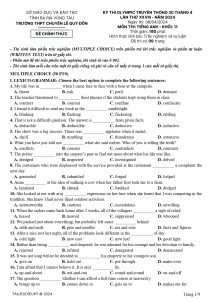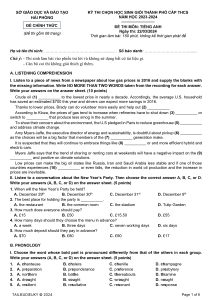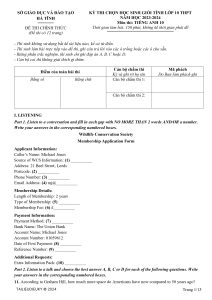Đề thi chính thức tuyển sinh lớp 10 THPT TP Hồ Chí Minh năm học 2018-2019 môn Tiếng Anh (Môn chuyên) là một trong những đề thi cực kỳ quan trọng đối với thí sinh thi vào trường THPT Chuyên Lê Hồng Phong, THPT Chuyên Trần Đại Nghĩa do sở GD&ĐT TP Hồ Chí Minh tổ chức.
Thông tin về đề thi và đáp án đã được chia sẻ công khai trên trang web Tài liệu diệu kỳ, nơi cung cấp nhiều tài liệu học Tiếng Anh nâng cao như sách ôn luyện kì thi THPT Quốc gia, đề thi chọn học sinh giỏi quốc gia THPT môn Tiếng Anh từ 2011-2022 và tài liệu luyện thi chứng chỉ IELTS.
Để tìm kiếm bài viết này, người dùng có thể sử dụng các từ khóa như "đề thi tuyển sinh lớp 10 chuyên tiếng anh hcm 2018-2019", "đề thi tuyển sinh lớp 10 thpt môn tiếng anh chuyên", "đề thi chính thức tuyển sinh lớp 10 THPT TP Hồ Chí Minh 2018-2019", "tài liệu ôn luyện thi THPT Quốc gia", "đề thi chọn học sinh giỏi quốc gia THPT môn Tiếng Anh", "tài liệu luyện thi chứng chỉ IELTS" và "tài liệu Tiếng Anh nâng cao".
Ngoài ra, trên trang web Tài liệu diệu kỳ còn cung cấp nhiều tài liệu khác, bao gồm sách và tài liệu Tiếng Anh nâng cao (CPE, CAE, FCE...), tài liệu dành cho học sinh chuyên Anh và các chủ đề như từ vựng ngữ pháp, biến đổi câu, luyện nghe, luyện nói, đề luyện tập, đề thi Olympic truyền thống, đề thi chọn học sinh giỏi lớp 12 THPT và đội tuyển dự thi học sinh giỏi Quốc gia THPT. Tất cả các tài liệu này sẽ giúp các bạn học tập và rèn luyện kỹ năng Tiếng Anh một cách hiệu quả.
I. USE OF ENGLISH (3.0 PTS)
PART A: CHOOSE THE CORRECT ANSWER TO FILL IN THE BLANK. (1.5 PTS)
1. Every Christmas of my childhood was the same. My father __________ late for lunch, weighed down with presents for the family.
A. would arrive B. could arrive C. was arriving D. got used to arriving
2. If I __________ you a free ticket, would you go to Florence with me?
A. would offer B. were to offer C. had offered D. were offered
3. “You __________ things. Can’t you be more careful?” said Tom’s mother.
A. always lose B. are losing C. always lost D. are always losing
4. __________ in the next room, her voice is like __________ of a boy.
A. Hearing / the sound B. Hearing / the one C. Heard / that D. Having been heard / that one
5. I’d say let’s meet on Saturday but I’m none __________ sure what’s happening at the weekend.
A. so B. very C. that D. too
6. When the exam is over, I’ll go fishing - __________ I haven’t done for weeks.
A. anything B. something C. things D. everything
7. We’re going to visit the Great Walls. Everybody says this is __________.
A. a too good chance for being lost B. too good a chance to be lost
C. too good a chance for being lost D. a too good chance to lose
8. __________, her suggestion is of greater value than her friend’s.
A. All things considered B. All things considering C. Considering all things D. Considered all things
9. As far as I am concerned, education is about learning and the more you learn, __________.
A. the more for life are you equipped B. the more life you equip for
C. the more equipped for life you are D. the more life you are equipped for
10. He wants to give his daughters __________ he can afford.
A. all for the best B. the very best C. at best D. what best
11. __________ Sam had was gone when she heard that nearly all her classmates had failed to answer the teacher’s question.
A. A little confidence B. The little confidence C. Little confidence D. Little of confidence
12. __________ the difficulty of the task, I shall be lucky to have completed it by June.
A. Regarding B. Presuming C. Given D. Encountered
13. Diana took a course in shorthand and typing __________ applying for a secretary job.
A. on account of B. with a view to C. with a reason for D. for fear of
14. Jessica has bungled every task her boss has given her so far. __________, he’s prepared to give her one last chance.
A. Notwithstanding B. Instead C. Furthermore D. Nevertheless
15. The restaurant is popular with film stars and the __________.
A. same B. like C. such D. similar
16. Tom’s decision to leave university after a year is one he now __________ regrets.
A. painfully B. harshly C. heavily D. deeply
17. Pollutants in this river are increasing __________ - something must be done about it immediately.
A. chillingly B. utterly C. rigorously D. alarmingly
18. Although his paintings are abstract, the artist __________ inspiration from the natural world.
A. draws B. pulls C. makes D. has
19. She __________ with pleasure at the unexpected compliment.
A. grinned B. glared C. beamed D. laughed
20. As Jane lay in her cabin, she heard the gentle sound of waves __________ against the hull.
A. pelting B. splashing C. gushing D. lapping
21. David was so __________ by the beauty of Ha Long Bay that he instantly decided to move there.
A. captured B. captivated C. accumulated D. beckoned
22. Many species of fish have __________ ways of protecting their eggs from predators.
A. ingenious B. indicative C. inspiring D. ingenuous
23. No-one knows how the rival company got __________ of the plans for their new marketing campaign.
A. wind B. breeze C. voice D. ear
24. Family relationships later __________ a great significance in his life.
A. built up B. kept on C. took on D. made up
25. For non-native speakers, it is not unusual for understanding to __________ when listening to others’ conversations in English.
A. fall away B. break down C. give up D. set out
26. Since we had only one day left, we decided to make an __________ effort to finish the run in record time.
A. all-in B. all-out C. overall D. all-around
27. Julian is one of the many young, __________ artists to be taken recently by an important gallery.
A. bottom-up B. up-and-coming C. top-down D. out-and-out
28. Jimmy’s not interested in the __________. He just wants to know the plain facts.
A. cut and thrust B. hue and cry C. ifs and buts D. part and parcel
29. Mai: __________?
Lan: I’m pretty busy right now. I’m doing my homework because I have an exam tomorrow.
A. How is your day going? B. How are you doing?
C. What do you do? D. What are you doing here?
30. Student 1: – Excuse me! Could you show me the way to the library?
Student 2: – Sorry, I’m new here.
Student 1: – __________.
A. Not at all. B. Bad luck.
C. No problem. D. Thank you all the same.
PART B: CHOOSE THE WORD OR PHRASE THAT BEST FITS EACH SPACE IN THE FOLLOWING PASSAGE. (1.5 PTS)
In recent years, ready-made meals have (1) __________ Britain’s eating (2) __________. Britons now spend four times as much as the Italians on ready-made meals and six times more than the Spanish. (3) __________ for instant meals has increased across Europe as a (4) __________, but why has Britain become the (5) __________ European capital of ready-made food, second only in the world to America?
Convenience is (6) __________ of the attraction. A recent survey (7) __________ that 77 percent of purchasers said they only bought ready meals when they did not have time to cook, Dr Susan Jebb, head of nutrition at the Medical Research Council, said: 'People in the UK work the longest hours, we are very time-poor, and we don't have a strong (8) __________ history of cooking.' The ready-made meal boom also reflects changing social (9) __________ in Britain. More people live alone and so are less Key to be (10) __________ to cook. And with families eating together less often, ready meals allow people to eat what they want when they want. Julia Michna, of Marks and Spencer, says that ready meals also reflect changing (11) __________ in food. 'Britain's multiculturalism has brought a (12) __________ range of restaurants than other European countries, and ethnic cuisines, which people are often scared of cooking from (13) __________, are (14) __________ more popular. One quarter of (15) __________ meals are Indian, and nearly one in five are Chinese.
1. A. amended B. adjusted C. transferred D. transformed
2. A. ways B. forms C. habits D. manners
3. A. Request B. Order C. Demand D. Charge
4. A. conclusion B. total C. result D. whole
5. A. unclaimed B. unclassified C undefeated D. undisputed
6. A. element B. piece C. part D. share
7. A. found B. made C. put D. gave
8. A. traditional B. cultural C. modern D. customary
9. A. trends B. temptations C. drifts D. movements
10. A. offended B. bothered C. worried D. disturbed
11. A. desires B. likings C. tastes D. wishes
12. A. longer B. deeper C. harder D. wider
13. A. scratch B. beginning C. memory D. nowhere
14. A. very B. lot C. far D. such
15. A. chilled B. decent C. meager D. junk
II. READING (3.5 PTS)
PART A: READ THE PASSAGE AND CHOOSE THE BEST ANSWERS TO THE QUESTIONS (1.0 PT)
The radical change in the land's surface that results when rural areas are transformed into cities is a significant cause of the rise in temperature in cities that is known as urban heat island.
First, the tall buildings and the concrete and asphalt of the city absorb and store greater quantities of solar radiation than do the vegetation and soil typical of rural areas.
In addition, because the concrete and asphalt are impermeable, the runoff of water following a rain is rapid, resulting in a severe reduction in the evaporation rate. So heat that once would have been used to convert liquid water to a gas goes instead to increase the surface temperature further.
At night, although both city and countryside cool through radiation losses, the stone-like surface of the city gradually releases the additional heat accumulated during the day, keeping the urban air warmer than that of the outlying areas.
Part of the urban temperature rise must also be attributed to waste heat from such sources as home heating and air conditioning, power generation, industry, and transportation. Many studies have shown that the magnitude of human-made energy in metropolitan areas is equal to a significant percentage of the energy received from the Sun at the surface.
Investigations in Sheffield, England, and Berlin showed that the annual heat production in these cities was equal to approximately one-third of that received from solar radiation. Another study of the densely built-up Manhattan section of New York City revealed that during the winter the quantity of heat produced from combustion alone was two and one-half times greater than the amount of solar energy reaching the ground. In summer the figure dropped to one-sixth.
It is interesting to note that during the summer there is a mutual reinforcement between the higher night-time temperatures of the city and the human-made heat that helped create them. That is the higher temperatures result in the increased use of air conditioners, which in, turn, use energy and further increase the amount of urban heat. During the winter the night-time warmth of urban areas, produced in large part by heavy energy consumption, is beneficial because less energy is needed to heat buildings.
1. What does the passage mainly discuss?
A. The loss of farmland to urban development
B. The causes of increased heat in cities
C. Waste heat generated by home heating and air conditioning
D. How seasonal change affects the temperature of cities.
2. All of the following contribute to the urban heat island effect EXCEPT
A. absorption of heat from the Sun
B. storage of heat from the Sun
C. an increased rate of evaporation after a rainfall
D. the release of heat at night from city surfaces
3. The word convert in the passage is closest in meaning to
А. reverse B. transform C. reduce D. compare
4. The word that in the passage refers to
A. city B. heat C. day D. air
5. In which of the following locations would the rate of evaporation probably be highest?
A. A rural area B. A small town C. A medium-sized city D. A big city
6. The word magnitude in the passage is closest in meaning to
A. calculation B. comprehension C. extent D. formation
7. The author mentions Manhattan in order to demonstrate that
A. heat in urban areas can be reduced
B. the conclusions of the investigation in Sheffield were wrong
C. its heat production is smaller than that of Berlin
D. human-made heat can exceed the solar energy that reaches the ground in winter
8. According to the passage, an important consequence of the use of air conditioners at night is
A. greater energy costs B. higher levels of urban heat
C. serious problems with the energy supply D. less need for air conditioning in the morning
9. The word beneficial in the passage is closest in meaning to
A. predictable B. powerful C. hazardous D. advantageous
10. Which of the following is true about cities at night in the winter?
A. Solar energy has an increased impact on the urban heat island.
B. They tend to be colder than rural areas.
C. Less energy is required to heat buildings.
D. Human-made energy creates a larger area of total heat than solar energy.
PART B: REARRANGE THE FOLLOWING SENTENCES SO THAT THEY MAKE A MEANINGFUL REVIEW OF A COMPUTER GAME. (0.5 PT)
A selection of viewpoints, including a breakneck ‘biker's eye view’, are offered. This game will push your skills and patience to the limit.
There are 10 tracks, of which three are available at the outset. Only by scoring gold in both classes on all of these can you gain access to the next three, and so on.
Wonder Racer succeeds in bringing the body-breaking speed of time-trial biking to the PC, but its difficulty may leave you shaking. The approach is simple and unsophisticated.
The courses are a fictitious mix of country lanes, exotic beaches and snowy mountain passes. The 3-D is excellent in its speed, smoothness and level of detail.
There are only three controls, far fewer than in many other modern games. Players start by selecting one of sixteen riders, from a set of teams.
PART C: SUPPLY EACH BLANK WITH ONE SUITABLE WORD. (2.0 PTS)
PASSAGE 1
It is forecast that we can we can look forward to working (1) __________ hours in the future, but it is necessary for health and tranquillity to work a certain (2) __________ of hours per week, ideally doing a variety of jobs - something schools have always known. It may be that house building will meet this need. It is a very basic human instinct. Gardening is a related activity. It is already (3) __________ to cultivate many fruits and vegetables than to buy them in the shops and the house of the next decade should take this into (4) __________.
(5) __________ important question is that of energy conservation. The proportion of income (6) __________ on keeping warm is steadily going up, and, with the cost of energy likely to double in real terms during the next ten years or (7) __________ many large badly-insulated old houses will become extremely expensive to use. The demand will be (8) __________ small, well-insulated homes located in warm protected areas and making the best (9) __________ of the sun's warmth. Efficient heating units will be of prime importance. At (10) __________ we waste a lot of space in planning rooms which are awkward to use.
PASSAGE 2
We live surrounded by objects and systems that we take for (1) __________ but which profoundly affect the way we behave, think work, play, and in general lead our (2) __________. Look, for example, at the place in which you are reading this now, and see how much of (3) __________ surrounds you is understandable, how much of it you could actually build yourself or repair (4) __________ cease to function. When we start the car or press the (5) __________ in the elevator, or buy food in the supermarket, we gave no (6) __________ to the complex devices or systems that make the car move, or the elevator rise, or the food appear on the shelves. Throughout this century we have become increasingly dependent on the products of (7) __________. They have already changed our lives: at the simplest (8) __________, the availability of transport has made us physically less fit than our ancestors. Many people are alive only because they have been given (9) __________ to disease through drugs. The vast majority of the world's population relies on the ability of technology to provide and transport food. We are unable to feed and clothe or keep (10) __________ warm without technology.
III. ERROR IDENTIFICATION (0.5 PT)
IDENTIFY THE FIVE (05) MISTAKES IN THE FOLLOWING PASSAGE AND CORRECT THEM.
IV. WORD FORMS (1.0 PT)
SUPPLY THE APPROPRIATE FORMS OF WORDS IN THE BRACKETS.
1. His tour was cut __________ short due to his illness. [appoint]
2. Since the city center became a(n) __________ pedestrian area, shopping had been a more pleasant experience. [traffic]
3. I’ve __________ the CNN homepage as I use it regularly to get the latest news.
4. The __________ at the temple are bringing heart for peace and prosperity. [devotion]
5. A(n) __________ life, lack of physical activity, stressful jobs, and bad habits can influence one’s health in a very bad way. [pace]
6. Officials urged caution in anticipation of catastrophic and __________ flooding in the days to come. [threat]
7. The store manager explained __________ that only certain items were sold at a discount. [apology]
8. Women are traditionally supposed to be good at __________. [task]
9. The recent events __________ the need for a better understanding of the environmental impact of biotechnology. [score]
10. __________ fines may be issued for careless driving and other offenses. [spot]
V. WRITING (2.0 PTS)
REWRITE THE FOLLOWING SENTENCES WITHOUT CHANGING THE MEANING. YOU HAVE TO USE THE EXACT WORD GIVEN IN BRACKETS FOR EACH SENTENCE.
1. I think you should get someone to fix the computer. [fixed]
→ I would prefer it
2. Jack was so nervous that his mind couldn’t function properly. [straight]
→ Such
3. Suddenly, the management said it was important for us to wear dark suits to the meeting. [once]
→ The management insisted
4. To say briefly, this school regulation cannot be abolished right away. [do]
→ In a
5. Trying to persuade someone to agree with you can be a formidable task. [view]
→ Trying to bring
6. Anna inherited a fortune when her father died. [into]
→ After the
7. We were not late for school because you took us in your car. [time]
→ If it hadn’t been for
8. I managed to finish the task, but it was difficult. [succeed]
→ Only with
9. Although she didn’t agree with the management’s decision, Chloe was forced to accept it. [choice]
→ Much
10. Fred didn’t tell Sophie his news until she had finished her homework. [telling]
→ Fred waited
THE END OF THE TEST
SỞ GIÁO DỤC VÀ ĐÀO TẠO THÀNH PHỐ HỒ CHÍ MINH
PHÒNG GIÁO DỤC TRUNG HỌC
***
HƯỚNG DẪN CHẤM MÔN TIẾNG ANH CHUYÊN
KỲ THI TUYỂN SINH LỚP 10 THPT – NGÀY THI 03 THÁNG 6 NĂM 2018
I. USE OF ENGLISH (3 pts)
Thí sinh không tô đen vào ô tròn có mẫu tự đại diện cho câu trả lời: không cho điểm.
PART A: (1,5 pts) (Mỗi câu trả lời đúng thí sinh được 0.05 điểm)
PART B: (1.5 pts) (Mỗi câu trả lời đúng thí sinh được 0.1 điểm)
II. READING (3.5 pts)
PART A: (1.0 pt) (Mỗi câu trả lời đúng thí sinh được 0.1 điểm)
Thí sinh không tô đen vào ô tròn có mẫu tự đại diện cho câu trả lời: không cho điểm.
PART B: (0.5 pt) (Mỗi câu trả lời đúng thí sinh được 0.1 điểm)
PART C: (2.0 pts) (Mỗi câu trả lời đúng thí sinh được 0.1 điểm)
PASSAGE 1 PASSAGE 2
III. ERROR CORRECTION (0.5 pts)
(Mỗi lỗi phát hiện đúng thí sinh được 0.05 điểm)
(Mỗi lỗi sửa đúng thí sinh được 0.05 điểm)
Các lỗi sửa không cần theo thứ tự.
IV. WORD FORMS (1.0 pt) (Mỗi câu trả lời đúng thí sinh được 0.1 điểm)
Không có dấu hyphen “–“ không cho điểm.
V. WRITING (2 pts) (Mỗi câu trả lời đúng thí sinh được 0.2 điểm)
Thí sinh sắp xếp sai vị trí, viết sai cấu trúc: không cho điểm
Thí sinh viết sai lỗi chính tả ảnh hưởng nghiêm trọng đến nghĩa của câu: không cho điểm
Thí sinh viết sai lỗi chính tả nhưng không ảnh hưởng đến nghĩa của câu: trừ 0.1 điểm
1. I would prefer it if you got / had the computer fixed. (by someone sai)
2. Such was Jack’s nervousness that he could not think straight.
3. The management insisted that we wear / on us wearing / on our wearing dark suits to the meeting all at once.
4. In a nutshell, they cannot do away with this school regulation.
5. Trying to bring someone around / round to your (point of) view can be a formidable task.
6. After the death of her father, Anna came into a fortune.
or After the death of Anna’s father, she came into a fortune.
7. If it hadn’t been for the lift you gave us, we wouldn’t have gone to school on / in time.
8. Only with difficulty did I succeed in finishing the task.
9. Much as she disagreed / didn’t agree with the management’s decision, Chloe had no choice / was left with no choice but / other than to accept it.
10. Fred waited for Sophie to finish her homework before telling her his news.



